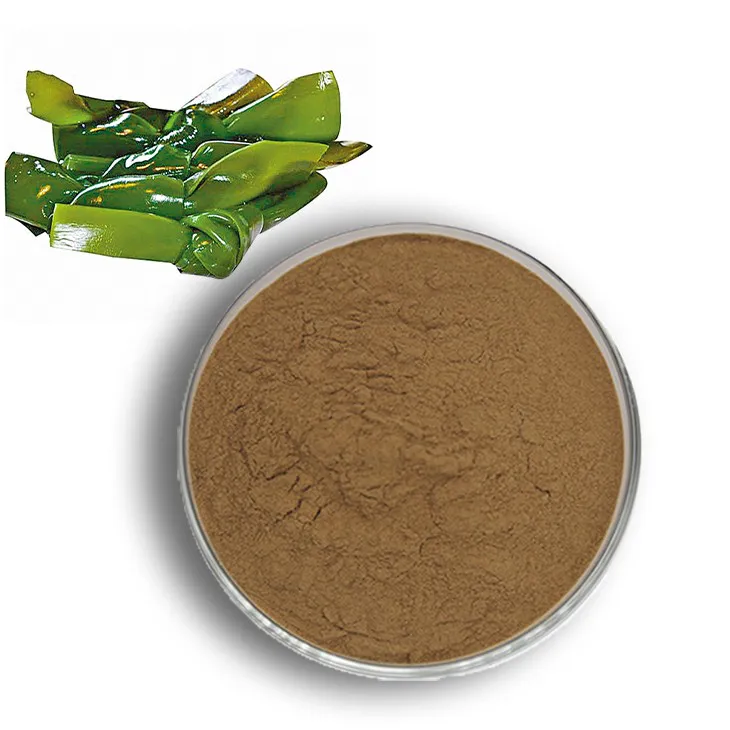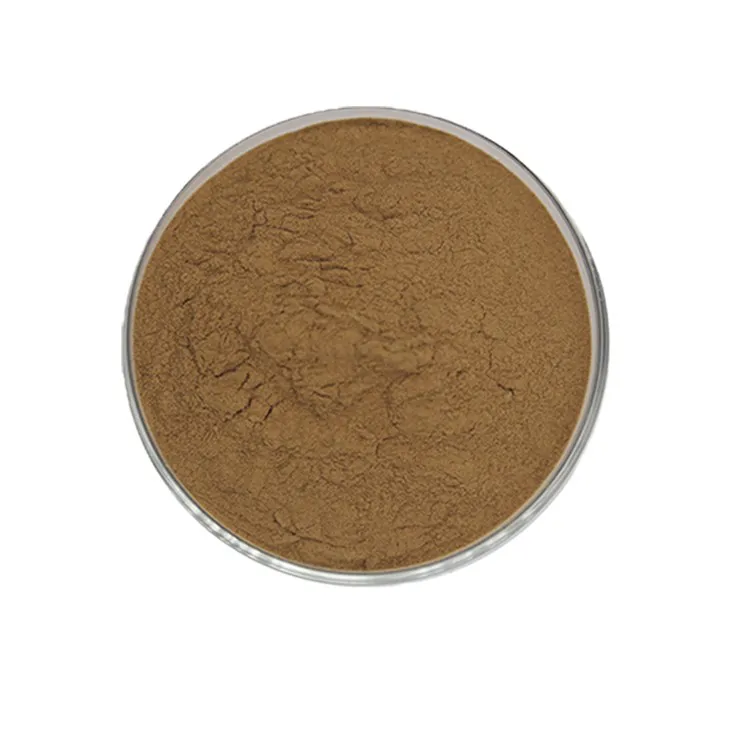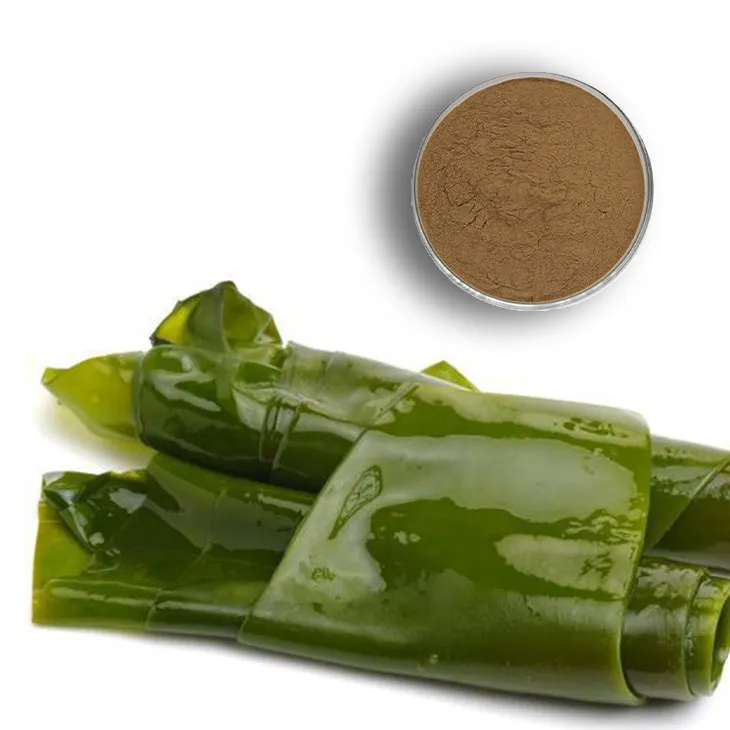- 0086-571-85302990
- sales@greenskybio.com
The Optimal Bioavailability of Kelp Extract Powder.
2024-11-28

1. Introduction
Kelp Extract Powder has been gaining increasing attention in recent years due to its rich nutritional content and potential health benefits. Bioavailability - the proportion of a substance that enters circulation when introduced into the body and has an active effect - is a crucial factor in determining the effectiveness of Kelp Extract Powder. Understanding how to achieve the best bioavailability of Kelp Extract Powder is essential for maximizing its potential in various applications, such as dietary supplements and functional foods.

2. Chemical Composition of Kelp Extract Powder
Kelp is a type of large seaweed that contains a wide variety of bioactive compounds. These include:
- Iodine: Kelp is one of the richest natural sources of iodine. Iodine is essential for the proper functioning of the thyroid gland, which regulates metabolism.
- Fucoidan: A complex polysaccharide with potential antioxidant, anti - inflammatory, and anti - cancer properties.
- Alginates: These are polysaccharides that can form gels and are used in various industries, including food and pharmaceuticals. In the body, they may have beneficial effects on digestion.
- Vitamins and Minerals: Kelp also contains vitamins such as vitamin K, vitamin C, and various minerals like potassium, magnesium, and calcium.
The presence of these compounds in kelp extract powder contributes to its potential health benefits. However, the bioavailability of these components can vary depending on several factors.

3. Forms of Kelp Extract Powder and Their Impact on Bioavailability
3.1 Raw Kelp Extract Powder
Raw kelp extract powder is in its most natural form, with minimal processing. While it contains all the natural compounds present in kelp, its bioavailability may be limited. The complex structure of some of the bioactive compounds, such as fucoidan and alginates, can make it difficult for the body to fully absorb them. For example, the large molecular size of fucoidan may prevent it from being easily taken up by cells.
3.2 Solubilized Kelp Extract Powder
Solubilizing kelp extract powder can enhance its bioavailability. This process breaks down some of the complex structures, making the bioactive compounds more accessible. For instance, solubilization can reduce the molecular size of fucoidan, allowing it to be more easily absorbed by the intestinal cells. However, the solubilization process needs to be carefully controlled to avoid damaging the bioactive compounds.
3.3 Encapsulated Kelp Extract Powder
Encapsulation is another technique used to improve the bioavailability of kelp extract powder. By encapsulating the powder in a protective coating, it can be protected from degradation in the stomach and intestine. This allows for a more controlled release of the bioactive compounds in the appropriate part of the digestive tract. For example, enteric - coated capsules can prevent the release of kelp extract powder in the acidic environment of the stomach and ensure its release in the more alkaline intestine, where absorption may be more favorable.

4. The Role of Diet in Kelp Extract Powder Bioavailability
Diet plays a significant role in determining the bioavailability of kelp extract powder.
4.1 Fat in the Diet
Some components of kelp extract powder, such as fat - soluble vitamins (e.g., vitamin K), may require the presence of dietary fat for optimal absorption. When consumed with a meal containing fat, the body is better able to emulsify and absorb these fat - soluble components. For example, a salad dressing made with olive oil can enhance the absorption of vitamin K from kelp extract powder when added to a salad containing kelp - based products.
4.2 Fiber in the Diet
High - fiber diets can both positively and negatively impact the bioavailability of kelp extract powder. On one hand, fiber can slow down digestion, allowing for more time for the absorption of bioactive compounds. On the other hand, excessive fiber intake may bind to some of the components in kelp extract powder and reduce their absorption. For instance, a diet high in insoluble fiber may decrease the absorption of iodine from kelp if consumed together without proper balance.
4.3 Other Dietary Components
Some minerals in the diet can interact with the components of kelp extract powder. For example, calcium can interfere with the absorption of iodine. Therefore, when consuming kelp extract powder, it is important to consider the overall mineral balance in the diet. Additionally, certain phytochemicals present in other foods may enhance or inhibit the bioactivity of kelp extract powder compounds, but more research is needed to fully understand these interactions.

5. Individual Differences and Kelp Extract Powder Bioavailability
Individual differences can also significantly affect the bioavailability of kelp extract powder.
5.1 Age
Age can play a role in how the body absorbs and utilizes kelp extract powder. For example, the digestive system of elderly individuals may be less efficient in breaking down and absorbing the complex compounds in kelp. On the other hand, children may have different requirements and absorption capabilities compared to adults. Infants, in particular, have a developing thyroid gland, and iodine from kelp extract powder needs to be carefully regulated to avoid potential over - or under - exposure.
5.2 Gender
There may be gender - related differences in the bioavailability of kelp extract powder. For example, women may have different hormonal profiles that can influence the absorption and metabolism of iodine, which is a key component of kelp. During pregnancy and lactation, women have increased iodine requirements, and the bioavailability of iodine from kelp extract powder may be different compared to non - pregnant women.
5.3 Health Conditions
Individuals with certain health conditions may experience altered bioavailability of kelp extract powder. For instance, people with thyroid disorders may have different absorption and utilization rates of iodine from kelp. Those with digestive disorders, such as Crohn's disease or celiac disease, may have impaired absorption due to damage to the intestinal lining. Additionally, individuals taking medications may experience interactions that affect the bioavailability of kelp extract powder. For example, some medications may interfere with the absorption of iodine or other components of kelp.
6. Strategies for Achieving Optimal Bioavailability
Based on the above factors, several strategies can be employed to achieve the optimal bioavailability of kelp extract powder.
- Proper Form Selection: Depending on the intended use and the target population, choosing the right form of kelp extract powder, such as solubilized or encapsulated forms, can enhance bioavailability.
- Dietary Considerations: Maintaining a balanced diet that takes into account the interactions between kelp extract powder and other dietary components is crucial. This includes ensuring an appropriate intake of fat, fiber, and minerals to optimize absorption.
- Personalized Approach: Considering individual differences such as age, gender, and health conditions can help in tailoring the consumption of kelp extract powder for maximum bioavailability. For example, pregnant women may need to adjust their iodine intake from kelp extract powder according to their individual thyroid function.
- Quality Control in Production: Ensuring high - quality production of kelp extract powder is essential. This includes proper harvesting, extraction, and processing methods to preserve the bioactive compounds and their bioavailability.
7. Conclusion
In conclusion, achieving the best bioavailability of kelp extract powder is a complex process that involves understanding its chemical composition, the impact of different forms, the role of diet, and individual differences. By taking into account these multiple factors and implementing appropriate strategies, it is possible to maximize the potential health benefits of kelp extract powder. Future research should continue to explore the various factors affecting bioavailability in more detail and develop new techniques to further enhance the effectiveness of this valuable natural product.
FAQ:
What is the chemical composition of kelp extract powder?
Kelp extract powder contains various components such as iodine, alginic acid, and a variety of vitamins (like vitamin C, vitamin K, etc.) and minerals (such as potassium, magnesium). These components play important roles in its potential health benefits and also might influence its bioavailability.
How do different forms of kelp extract powder affect its bioavailability?
Different forms, for example, powder form, capsule form, or liquid form, can have different effects on bioavailability. The powder form may have a large surface area which could potentially enhance absorption in the digestive tract. Capsules might protect the extract from degradation in the stomach before reaching the intestines where absorption occurs. Liquid forms may be more easily digested and absorbed in some cases, but it also depends on other factors like the presence of stabilizers and solvents.
What role does diet play in the bioavailability of kelp extract powder?
Diet can significantly affect the bioavailability of kelp extract powder. For instance, if the diet is high in certain substances that interact with the components of kelp extract powder, it may either enhance or reduce its absorption. High - fiber diets might slow down the absorption process as the fiber can bind to some of the components. On the other hand, a diet rich in fats may increase the absorption of fat - soluble vitamins present in the kelp extract powder.
How do individual differences influence the bioavailability of kelp extract powder?
Individual differences such as age, gender, and underlying health conditions can impact bioavailability. Elderly individuals may have a less efficient digestive system, which could lead to reduced absorption. Gender - related hormonal differences may also play a role. People with certain diseases like malabsorption syndromes will likely have lower bioavailability compared to healthy individuals.
What are the potential health benefits of achieving optimal bioavailability of kelp extract powder?
When the bioavailability of kelp extract powder is optimal, its potential health benefits can be fully realized. These may include improved thyroid function due to its iodine content, better digestion because of alginic acid which can act as a prebiotic, and enhanced antioxidant status from the vitamins and minerals present. It may also contribute to cardiovascular health by regulating blood pressure and cholesterol levels.
Related literature
- Bioavailability of Nutrients from Seaweed - Based Products"
- "The Influence of Kelp Components on Absorption and Metabolism"
- "Optimizing the Use of Kelp Extract in Dietary Supplements: A Review of Bioavailability Factors"
- ▶ Hesperidin
- ▶ citrus bioflavonoids
- ▶ plant extract
- ▶ lycopene
- ▶ Diosmin
- ▶ Grape seed extract
- ▶ Sea buckthorn Juice Powder
- ▶ Beetroot powder
- ▶ Hops Extract
- ▶ Artichoke Extract
- ▶ Reishi mushroom extract
- ▶ Astaxanthin
- ▶ Green Tea Extract
- ▶ Curcumin Extract
- ▶ Horse Chestnut Extract
- ▶ Other Problems
- ▶ Boswellia Serrata Extract
- ▶ Resveratrol Extract
- ▶ Marigold Extract
- ▶ Grape Leaf Extract
- ▶ blog3
- ▶ blog4
-
D - Mannose Manufacturer
2024-11-28
-
The best organic chia seed powder.
2024-11-28
-
The extraction process of Maca extract.
2024-11-28
-
Organic Motherwort Extract Powder Supplier.
2024-11-28
-
The Pure Vitamin K2 Most Worth Buying.
2024-11-28
-
Centella Asiatica Extract
2024-11-28
-
Uridine-5'-monophosphate Disodium salt
2024-11-28
-
Aguaje Extract
2024-11-28
-
Pueraria Lobata Extract
2024-11-28
-
White mustard seed extract
2024-11-28
-
Epimedium extract powder
2024-11-28
-
Scutellaria Extract
2024-11-28
-
Ivy Extract
2024-11-28
-
White Willow Bark Extract
2024-11-28
-
Longan Extract
2024-11-28





















